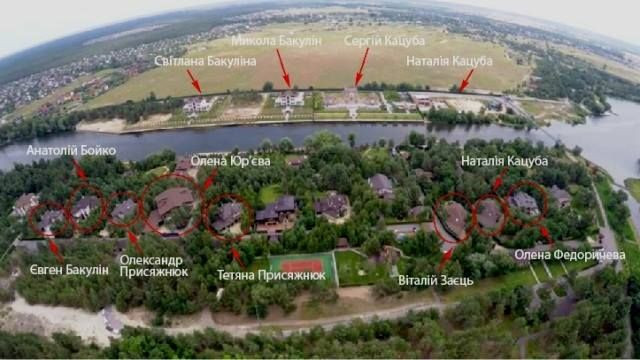Ukraine's Corruption Battle: The Fight Against Graft Goes Online

Natalia Shyrba had never even been to the southwestern Ukrainian city of Odessa when she decided to move there in August to take an unpaid job fighting one of the country's biggest problems: corruption. The 26-year-old, who was born in Ukraine, left behind a comfortable life in Philadelphia to help build an online government platform where people can ask questions and submit complaints about day-to-day issues like damaged roads. The service is supposed to reduce face-to-face government interactions and the potential for corrupt officials to extract bribes from desperate citizens, a pervasive problem in the former Soviet republic.
“Here in Ukraine, the biggest issue is that the government is a roadblock to getting things done whereas the government should really be a service for the citizens,” Shyrba said. “If you eliminate the human factor, you can eliminate corruption. You can’t bribe a computer.”
Two years after Ukraine’s Euromaidan revolution swept the streets of Kiev with cries to fight corruption and turn the nation westward toward the European Union, a new generation of government activists is working to fight graft by going online. A network of unpaid volunteers across the country is trying to disrupt a deeply entrenched culture of theft by digitizing government services and documents in an effort to create transparency and hold politicians accountable. They face significant challenges, with only 7 percent of Ukrainians recently saying the longtime fight against corruption has shown any results.
Ukraine's push against graft comes after the Euromaidan revolution that began in November 2013 when President Viktor Yanukovych refused to sign an association agreement with the EU. His eventual ouster set off a ripple of events, with Russia annexing Crimea in March 2014 and war breaking out in the eastern Donbass region that has left 8,000 dead. Yanukovych's massive estate replete with a zoo and several mansions was turned into a museum highlighting the country's corruption problem after he fled for Russia in February 2014. Documents left behind at the estate showed how public money was spent to enrich Yanukovych, his family and close associates.
But Ukraine's problems go further than corrupt politicians driving expensive cars and building mansions. Average citizens report paying bribes to low-ranking government workers to either receive basic services or ensure preferential treatment. For example, Ukrainians sometimes must pay health workers extra to receive care and they can guarantee their children will receive higher grades in school by opening their wallets. The endemic corruption has led Transparency International, a global anti-corruption nonprofit, to name Ukraine one of the world's most corrupt nations along with Uganda and the Comoros.

A big part of putting information online is about gaining trust, Shyrba says, and that will require making Ukrainians comfortable with using online resources and reassuring them it’s not a gimmick -- someone will actually answer their queries. The team is working on numerous projects such as getting administrative services like passport requests online, as well as some not so “glamorous” projects including teaching older civil servants how to use email and introducing online project management tools.
“There is political pushback,” said Shyrba, who works with a 15-person team. “We are trying to break a really old and corrupt system.”
Hopes were high that with the May 2014 election of Ukraine's current president, Petro Poroshenko, reforms and the fight against theft would begin in earnest, but change has been slow. During a visit to Kiev to discuss the ongoing war, U.S. Vice President Joe Biden urged Ukrainians Monday to "root out the cancer of corruption."
“It’s the issue of the country’s survival," said Daria Kaleniuk, 28, executive director of the Anti-Corruption Action Center, a Ukrainian civil society organization based in Kiev with 15 staff members mainly in their 20s. "If we don’t succeed in the this war [against corruption], we risk losing the whole country.”
Constructive 'Hackers'
When the prime minister of Ukraine asked Denis Gursky, 30, to join him for a meeting this spring he never expected to walk out of the government building as the leader’s open data adviser. The IT professional had been working with other civil society organizations to create an open data law for Ukraine that was passed in April and requires government agencies to publish their data online in machine-readable form and also on a national open data portal. Gursky now envisions a world where any Ukrainian can sit down at their kitchen table and look at online registries to see how a country long plagued by corruption is spending its money.
Ukraine has a growing IT sector and a large talent pool that often makes news for all the wrong reasons with headlines such as “U.S. Identifies Insider Trading Ring With Ukraine Hackers.” But as the government takes steps to implement the open data law by its March 2016 deadline, Gursky said he hopes more of the country's IT professionals will be drawn to working with public officials on projects citizens need and want.
“We have to provide real data to people about finances, budgeting and everything that is possible,” Gursky said. He estimates the cost of maintaining the national open data portal will be around $1 million a year.
Some financial information has already been put online, including registries of companies and property the government owns. Journalist Andrii Bashtovyi, 25, co-founder of Hromadske TV, a journalism outlet born during Ukraine’s revolution, says his media organization has been able to publish stories about money stolen from the country’s war effort because of the open registries.
There are other signs that Ukraine's anti-graft campaign has made strides. Last month, 30-year-old Nazar Kholodnytsky was appointed Ukraine’s top anti-corruption prosecutor.
“The job of the [anti-corruption] bureau is to uncover large-scale corruption,” said Alexander Motyl, a professor of political science at Rutgers University in Newark, New Jersey, who specializes in Ukraine. “They are supposed to go after the big fry ... there is a lot of hope they will be able to do it.”

Slow Steps
But open data and e-government initiatives will get Ukraine only so far, experts say. Activists have also called on Ukrainian lawmakers to privatize some of the over 1,800 state corporations that continue to allow oligarchs and politicians to siphon off state funds. Experts estimate that well over 1,000 state corporations could be sold off or eliminated to reduce theft in key sectors including energy and infrastructure.
E-government reforms "won’t address billion-dollar kickbacks in the energy sector,” Motyl said. “It’s relatively small-scale, but on the other hand these are the things that concern most people.”
Ukraine is also grappling with crucial financial problems that could slow down efforts to invest in record keeping and online services. The International Monetary Fund has vowed to bail out Ukraine with a multibillion-dollar package and the World Bank has predicted a 12 percent decline in gross domestic product this year.
But advocates of putting more government records online say national lawmakers must prioritize transparency to nurture citizens' faith in Ukraine's future.
“We are moving in slow steps,” said Bashtovyi, the investigative journalist. “But we should constantly see progress and constantly see people going to prison if they are stealing money.”
© Copyright IBTimes 2024. All rights reserved.






















